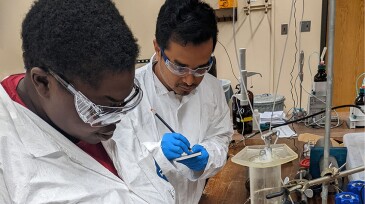engineering education
-
A survey of SPE members associated with a university, or their job/role to be faculty, collected information about the effect of the energy transition on recruiting students, strategic directions in academic programs, and maintaining a relevant curriculum for future careers.
-
More Students Going Into Petroleum Engineering Programs as Research Work Tilts to Alternative EnergyMore freshmen are enrolling in petroleum engineering, drawn by strong demand for graduates.
-
Data and AI will change our industry for the better. At the root of this change will be the empowerment of engineers to make better decisions.
-
Finding talent to advance technologies for energy transition is among the top concerns for executives in oil and gas, utilities, chemicals, mining, and agribusiness. Talent shortages, especially for technical experts, are slowing down progress.
-
The expanded scope of our evolving industry means that members of the petroleum engineering profession will enjoy a long, rewarding career. At the same time, we will need to continue developing our competencies to enable expected contributions in producing new forms of energy resources.
-
The industry continues its move toward energy transition, demonstrating different stages among companies. These industry changes are affecting our current and future members, and SPE is working to provide guidance and education to our members through many avenues.
-
The trend in falling petroleum engineering graduation rates is good for job seekers.
-
Spending plans announced by oil and gas companies indicate that about 80% of their budgets are directed toward traditional E&P, efforts to reduce emissions and carbon footprints, and sustainable investment in new energy. It is reasonable to expect that with these budget increases, there will be an uptick in the employment of petroleum professionals.
-
When it comes to workers’ salaries in oil and gas vs. clean energy, how does their compensation compare? The answer depends on the roles of workers and their locations, qualifications, experience, training—and personal decisions.
-
Opening additional channels of communication with our members provided important feedback to move forward with the Strategic Plan.










